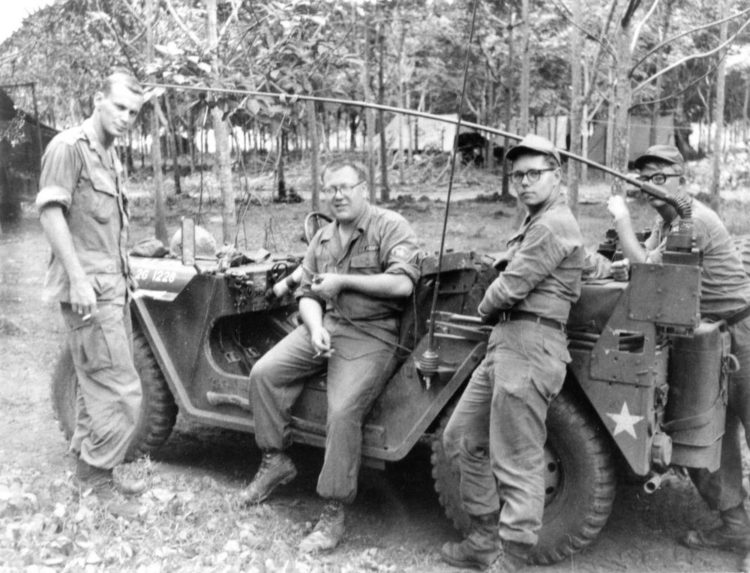On 24 October 1966, 1st Lt. John F. Cochrane of the 409th Radio Research Detachment (RRD), 303d Radio Research Battalion, was killed by a Viet Cong sniper while looking for a suitable site to set up a PRD-1 direction finder. He was one of two battlefield losses within the detachment.
The 409th RRD arrived in Vietnam on 8 September 1966. Activated in April at Fort Meade, the new detachment was to provide tactical support to the newly formed 11th Armored Cavalry Regiment (ACR). By early October, the 409th’s seventy-seven enlisted personnel and three officers had assembled at a staging area east of Bien Hoa. From there, small teams deployed with elements of the 11th ACR during combat operations to intercept enemy Morse and voice communications and conduct radio direction finding. Other teams remained at collection sites on isolated fire support bases behind the front lines.
The 409th RRD’s executive officer/operations officer was 1st Lt. John F. Cochrane. In 1963, the 23-year-old Michigan native had enlisted in the U.S. Army after two years at Taylor University in Indiana, where he was working toward a degree in psychology. After completing Infantry Officer Candidate School, Airborne School, and Jungle Warfare School, he was assigned to Lt. Col. John J. Masters’ 303d Army Security Agency (ASA) Battalion in Fort Wolters, Texas.
In April 1966, the 303d deployed to Vietnam to support the II Field Force out of Long Binh. Cochrane served as the battalion’s communications center officer. By July, newly promoted 1st Lt. Cochrane was happy to get out in the field, leading a forty-man platoon in support of the 1st Infantry Division’s operations. Additionally, for six weeks in August and September, Colonel Masters loaned Cochrane and twelve men with four PRD-1 positions to the 1st Australian Task Force prior to and during the Battle of Long Tan.
In late September, Cochrane learned he had been transferred as the executive officer to the incoming and inexperienced 409th RRD assigned to support the 11th ACR. This unique ASA unit assigned to the Army’s only ACR had some exciting enhancements. Because the 409th teams were constantly on the move, they installed their equipment in M113s instead of their normal jeeps. This allowed them to keep up with the fast-moving regimental troops and provided them additional firepower and armored protection. In a letter to his wife, Cochrane wrote, “If we do the job right, we will be ‘writing the book’ as far as operations of this sort are concerned. It hasn’t ever been done before. We’re learning.”
As the operations officer, one of Lieutenant Cochrane’s primary responsibilities was locating the detachment’s PRD-1 listening posts. It was while siting one of these posts that Lieutenant Cochrane was killed, six months into his tour and just one week before he was scheduled to meet his wife in Hawaii. On the morning of 24 October 1966, Cochrane was passenger in a truck driven by the detachment commander, Capt. Lee Gentry, with acting Sgt. Frederick D. Evans in the back seat. As the jeep turned to ascend a hill, an enemy command-detonated mine exploded in front of the jeep; this was followed by four rounds of sniper fire. One shot punched through the passenger side of the windshield and hit Lieutenant Cochrane just above his left eye, killing him instantly. Captain Gentry was also wounded in the ambush.
After the incident, Colonel Masters wrote to Cochrane’s wife, “He was loved and respected by these officers and men, and his death has cast a pall over this entire battalion.” In his own diary, Masters referred to Cochrane as “one of the finest young officers I have ever known,” and wrote, “He was like a son to me and I will miss him.”
***
This piece is written by Lori S. Stewart from the U.S. Army Intelligence Center of Excellence. Want to feature your story? Reach out to us at [email protected].
Already have an account? Sign In
Two ways to continue to read this article.
Subscribe
$1.99
every 4 weeks
- Unlimited access to all articles
- Support independent journalism
- Ad-free reading experience
Subscribe Now
Recurring Monthly. Cancel Anytime.











COMMENTS